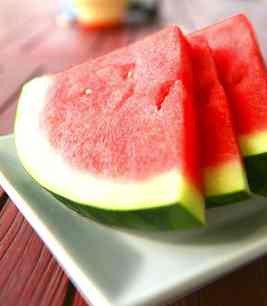- MENU
- HOME
- SEARCH
- WORLD
- MAIN
- AFRICA
- ASIA
- BALKANS
- EUROPE
- LATIN AMERICA
- MIDDLE EAST
- United Kingdom
- United States
- Argentina
- Australia
- Austria
- Benelux
- Brazil
- Canada
- China
- France
- Germany
- Greece
- Hungary
- India
- Indonesia
- Ireland
- Israel
- Italy
- Japan
- Korea
- Mexico
- New Zealand
- Pakistan
- Philippines
- Poland
- Russia
- South Africa
- Spain
- Taiwan
- Turkey
- USA
- BUSINESS
- WEALTH
- STOCKS
- TECH
- HEALTH
- LIFESTYLE
- ENTERTAINMENT
- SPORTS
- RSS
- iHaveNet.com: Recipes
Sharon Palmer, R.D.

Watermelon
True to its name, the watermelon has long been esteemed for its high water content. Its reputation as a "living canteen" began in sub-Saharan Africa, where it originated, and then spread to Egypt, where it was first cultivated more than 5,000 years ago. Depicted in hieroglyphs and buried in tombs of Egyptian kings, this thirst-quenching fruit was equally well regarded in Mediterranean countries where water was scarce. Around the globe this plump melon sparks tradition, from the refined Japanese custom of gifting the finest specimen, to American size competitions and seed-spitting contests.
A member of the Cucurbitaceae family, the watermelon (Citrullus lanatus) is related to the cantaloupe, squash, pumpkin and other plants that grow on vines on the ground. From the smooth green, yellow or white rind to the juicy pink, red, orange or yellow flesh -- every part of this fruit, seeds included, is edible. At 92 percent water content, this fruit sparkles with refreshing coolness, along with a hearty splash of the antioxidants vitamin C, beta-carotene and lycopene. Watermelon has the highest concentration of lycopene than any other fresh fruit or vegetable, and delivers more nutrients per calorie than many fruits. One cup serves up 21 percent of the daily value (DV) for vitamin C and 18 percent DV for vitamin A.
Watermelon's stockpile of vitamin C, vitamin A (through beta-carotene) and lycopene appears to neutralize free radicals, substances in the body that promote chronic disease. Research published in 2003 in the
The most flavorful melon has deeply colored seeds and flesh that displays no white streaks. If choosing a whole fruit, select one that's heavy for its size with a smooth rind that's not too shiny or too dull. Store at room temperature for maximum antioxidant benefits; watermelons stored just under 70 F have increased levels of lycopene and beta-carotene compared to refrigerated melons. Once cut, store in the refrigerator. Sliced, balled, in fruit or savory salads, on the grill, pureed into a smoothie or frozen into sorbet, there's no limit to the variety of ways to enjoy watermelon. The gourmet adventurer might even try pickled rind or roasted seeds.
Notable Nutrients in Watermelon
1 Cup, raw (154 grams)
Calories: 46
Vitamin A: 876 International Units (18% DV)
Vitamin C: 12.5 milligrams (21% DV)
Potassium: 173 milligrams (5% DV)
Magnesium: 15 milligrams (4% DV)
Beta-carotene: 467 micrograms
Lycopene: 6,979 micrograms
(DV=Daily Value)
Available at Amazon.com:
Be Good to Your Gut: Recipes and Tips for People With Digestive Problems
Subscribe to Receive our Gourmet Recipes
FOOD, DRINK & RECIPES [...]
APPETIZERS | SOUPS | PASTA | SALADS | MAIN COURSES | SEAFOOD | CHICKEN | PORK | LAMB | BEEF / VEAL | VEGETARIAN | SIDE DISHES | DESSERT | HEALTHY | WOLFGANG PUCK
Watermelon: Summer's Antioxidant
World-renowned chefs with an extraordinary passion for food share their passion on iHaveNet.com. These chefs make great cooking easier than imagined. Each gourmet recipe features expert advice and an easy-to-make recipe. Exactly what you need to transform your home cooking from acceptable to delectable
© Tribune Media Services